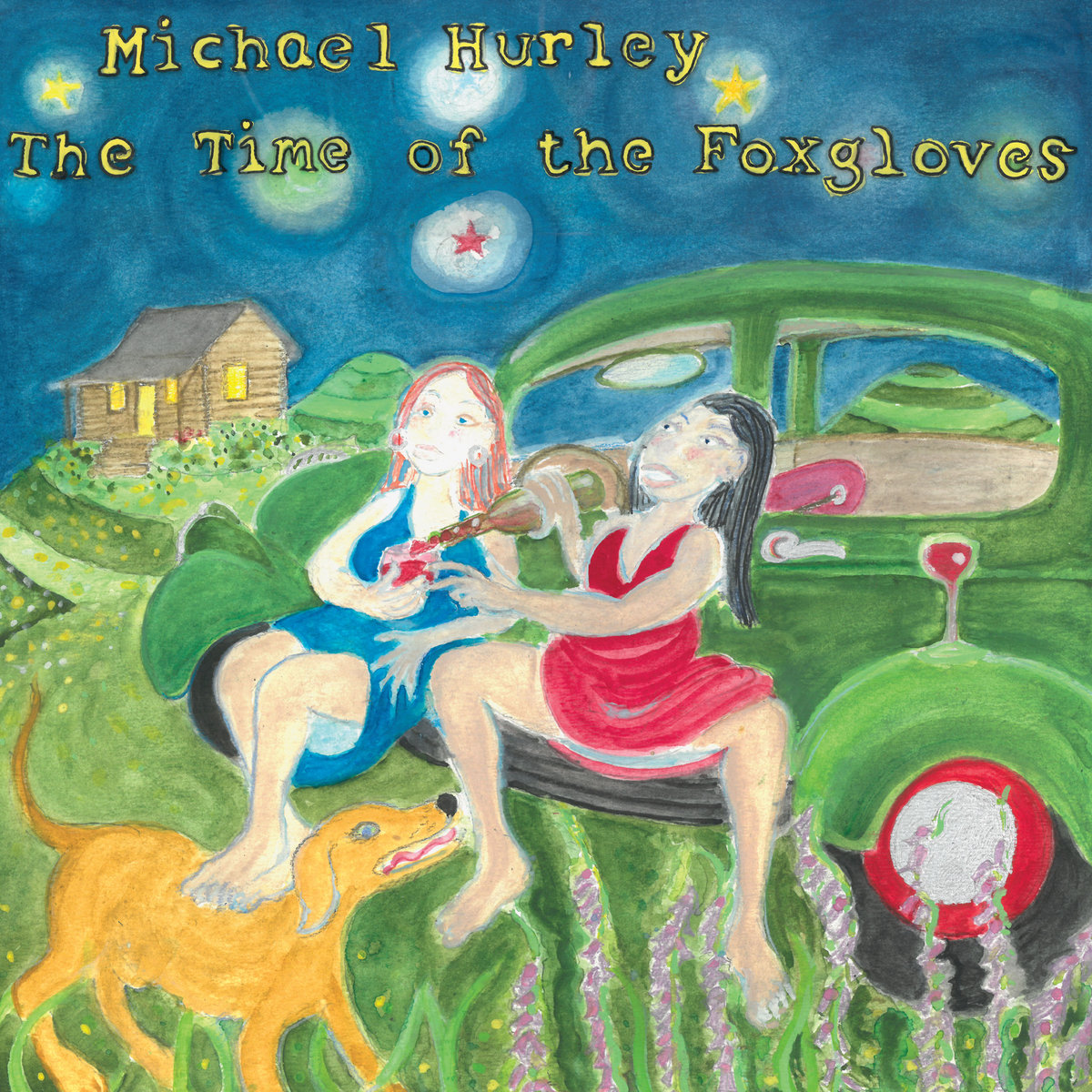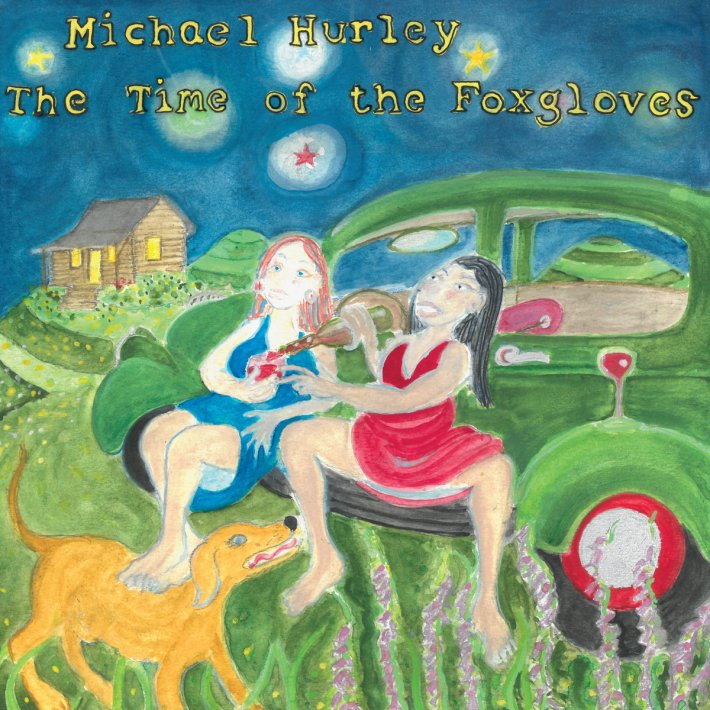- No Quarter
- 2021
I was thinking about Ida Blankenship recently. Ida Blankenship is not a real person. Portrayed by veteran actress Randee Heller, she was Don Draper's doddering secretary in the fourth season of Mad Men until, in the episode "The Beautiful Girls," she died at her desk. While Joan and Roger scrambled to write an obituary for Miss Blankenship, Bert Cooper chimed in with one of the most memorable lines from a series that yielded quite a few all-timers: "She was born in 1898 in a barn. She died on the thirty-seventh floor of a skyscraper. She's an astronaut."
I got to thinking about Miss Blankenship when considering the career of the folk music luminary Michael Hurley. Born in rural Bucks County, Pennsylvania at the tail end of 1941, Hurley grew up to be a fixture of New York's Greenwich Village folk scene in the 1960s and '70s. He released his first album on the legendary Folkways Records in 1964, the same year his peer Bob Dylan dropped The Times They Are a-Changin'. Fifty-seven years later, he's rolling out a new album via his Bandcamp page just days before his 80th birthday. I don't know if that makes Hurley an astronaut, but by music industry standards he has traveled light years.
The new LP, The Time Of The Foxgloves, is out this Friday via the esteemed Philadelphia label No Quarter. It's billed as Hurley's first studio album in 12 years and, according to a biography by Nathan Salsburg, his most hi-fi record since 1988's Watertower. Snock, as Hurley likes to call himself, recorded it alongside a dozen-odd collaborators at two studios near his adopted hometown of Astoria, Oregon last July, when the foxgloves bloom -- his favorite time of year according to Salsburg, curator of the digital Alan Lomax Archive and an increasingly legendary folk musician in his own right.
Salsburg is one of countless noteworthy folk and rock artists who've been inspired by Hurley. Although a cult of devotion has more or less always surrounded his quirky, roughshod music -- spurred on by influential critics like Byron Coley and Robert Christgau, who called Hurley's 1976 Holy Modal Rounders collaboration Have Moicy "the greatest folk album of the rock era" -- waves of appreciation from his disciples have buoyed him in 21st century. In the early 2000s Cat Power put Snock's "Sweedeedee" on The Covers Record and then recorded his signature song "Werewolf" for You Are Free. He was identified as the godfather of the mid-2000s "freak folk" scene by key players like Devendra Banhart, Vetiver, and Espers. Just this year artists including Yo La Tengo, Cass McCombs, Steve Gunn, and Calexico contributed to a tribute album called Snockument.
You don't have to know any of that history to appreciate The Time Of The Foxgloves. All you have to do is pull up a chair and listen. Despite its hi-fi origins, the album is pleasingly raw and homespun; it makes me feel like I'm sitting on a porch somewhere sweltering with Snock, just soaking in off-kilter bluesy folk tunes, sipping on something sweet. At their most sparse, as on the unhurried and rickety "Love Is The Closest Thing," these songs convey a startling intimacy. Even when they're punched up with a bit of accompaniment -- like the jazzy live staple "Se Fue En La Noche" and the Josephine Foster duet "Jacob's Ladder," both laced with bass clarinet and xylophone by Nate Lumbard -- the tender, handcrafted vibe remains. Snock and friends ease their way through each song like they've got all the time in the world and nowhere better to be. It's wonderful.
Hurley's disposition and personal history come through right away on opener "Are You Here For The Festival." He begins by putting Ohio's magnificent Nelsonville Music Festival, where he was a mainstay for a decade before the pandemic, right alongside history's most famous fest: "Did ya ever leave Nelsonville with a broken heart? Did ya ever leave Woodstock fallin' apart?" The track is a charming character portrait, all the more so thanks to the fiddles and banjo lending graceful color to Hurley's gruff vocal. A cover of the Louvin Brothers' "Alabama" is even prettier, Snock and Betsy Nichols entwining their voices into gorgeous earthy harmonies as they celebrate the natural beauty of the South. Most breathtaking of all might be Snock and Luke Ydstie plucking away serenely against the drone of Ydstie's pump organ on the instrumental "Knocko The Monk."
"I'm what they call a CC, a colorful character," Hurley sang on 1977's Long Journey. Much farther along on that journey, he remains one-of-a-kind but attuned to universal concerns. On The Time Of The Foxgloves, Snock consistently renders life's basics in ways that make me appreciate them anew, be it warm love, cold beer, or "summer morning breeze that's blowing through lush green trees." His music mirrors that impulse, pared down to fundamentals and fleshed out with just a few well-chosen flourishes. Rarely is that combination more affecting than in the album's final moments, as Hurley voices one last poignant sentiment: "Sorrow, ignore me please/ Leave me all days like these." We should all be grateful he was granted enough days to present us with another album as lovely as this.
The Time Of The Foxgloves is out 12/10 via No Quarter Records.
Other albums of note out this week:
• Neil Young & Crazy Horse's Barn
• The National's Cyrano soundtrack
• Fleet Foxes' A Very Lonely Solstice
• Beverly Glenn-Copeland's Keyboard Fantasies Reimagined
• Former Wrens member Kevin Whelan's debut as Aeon Station, Observatory
• Jeff Parker's Forfolks
• Bill Callahan & Bonnie 'Prince' Billy's covers collection Blind Date Party
• Rick Ross' Richer Than I Ever Been
• The latest posthumous Juice WRLD album Fighting Demons
• San Fermin's In This House
• Nicole Atkins' MEMPHIS ICE
• Nick Murphy (aka Chet Faker)'s Take In The Roses
• Jack Endino's Set Myself On Fire
• Teen Daze's Interior
• Delay's Songs For Money
• Dead Beast's Dead Beast
• Ziemba's Unsubtle Magic
• Kitten's Personal Hotspots
• Beatrice Deer's Shifting
• Green Day's The BBC Sessions
• Moses Sumney's Live From Blacklachia
• PnB Rock's 2 Get You Through The Rain EP
• Nightlands' Moonshine EP
• The second chapter of Beach House's Once Twice Melody







